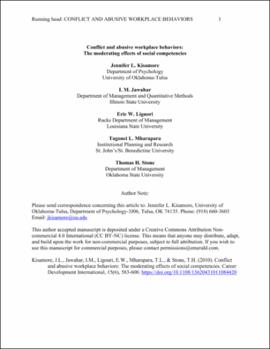| dc.contributor.author | Kisamore, Jennifer L. | |
| dc.contributor.author | Jawahar, I.M. | |
| dc.contributor.author | Liguori, Eric W. | |
| dc.contributor.author | Mharapara, Tagonei L. | |
| dc.contributor.author | Stone, Thomas H. | |
| dc.date.accessioned | 2022-04-29T17:20:39Z | |
| dc.date.available | 2022-04-29T17:20:39Z | |
| dc.date.issued | 2010-10-26 | |
| dc.identifier.citation | Kisamore, J.L., Jawahar, I.M., Ligouri, E.W., Mharapara, T.L., & Stone, T.H. (2010). Conflict and abusive workplace behaviors: The moderating effects of social competencies. Career Development International, 15(6), 583-600. https://doi.org/10.1108/13620431011084420 | en_US |
| dc.identifier.uri | https://hdl.handle.net/11244/335389 | |
| dc.description | This author accepted manuscript is deposited under a Creative Commons Attribution Non-commercial 4.0 International (CC BY-NC) license. This means that anyone may distribute, adapt, and build upon the work for non-commercial purposes, subject to full attribution. If you wish to use this manuscript for commercial purposes, please contact permissions@emerald.com. | en_US |
| dc.description.abstract | Purpose:
The purpose of this study is to investigate the moderating effects of social competencies, specifically, political skill, self‐monitoring and emotional intelligence, on the workplace conflict‐abusive behavior relationship.
Design/methodology/approach:
The study utilized data collected from graduate and undergraduate students majoring in psychology, management, human relations and social work who were recruited from two mid‐sized mid‐western universities. Hierarchical multiple regression analysis was used to test the study hypotheses.
Findings:
Results indicated that interpersonal conflict in the workplace is associated with employee engagement in counterproductive work behaviors. Results also suggested that social competencies interacted with interpersonal conflict to predict the likelihood of abusing others at work. Politically skilled workers and high self‐monitors were more likely to engage in abusive behaviors when experiencing high levels of interpersonal workplace conflict.
Originality/value:
The study is the first to show that certain social competencies may actually have negative ramifications in the workplace. Specifically, individuals who are politically skilled and/or high self‐monitors are more likely to abuse others when they themselves experience interpersonal conflict. | en_US |
| dc.language | en_US | en_US |
| dc.rights | Attribution-NonCommercial 4.0 International | * |
| dc.rights.uri | https://creativecommons.org/licenses/by-nc/4.0/ | * |
| dc.subject | Interpersonal relations | en_US |
| dc.subject | Conflict | en_US |
| dc.subject | Workplace | en_US |
| dc.subject | Employee behaviour | en_US |
| dc.title | Conflict and abusive workplace behaviors: The moderating effects of social competencies | en_US |
| dc.type | Article | en_US |
| dc.description.peerreview | Yes | en_US |
| dc.identifier.doi | https://doi.org/10.1108/13620431011084420 | en_US |
| ou.group | Dodge Family College of Arts and Sciences::Department of Psychology | en_US |

